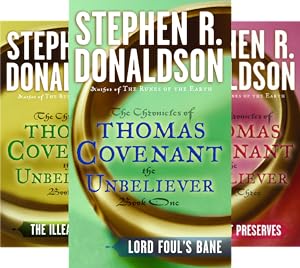
![]() The Power that Preserves by Stephen Donaldson
The Power that Preserves by Stephen Donaldson
If there is any consistent theme in the reviews and discussion of Stephen Donaldson’s THE CHRONICLES OF THOMAS COVENANT THE UNBELIEVER series, it is their divisiveness. Some readers are turned off by Covenant’s personality, while others are intrigued by his atypical qualities as an epic fantasy (anti-)hero. Some see the series as a Tolkien rip-off, while others believe the series is a fresh view on epic fantasy. And still others are turned on or off by Donaldson’s worldbuilding. The Power that Preserves (1979), the third book in the series, is consistent with the first two, and will probably change no one’s mind.
Covenant was thrown back into the real world at the end of The Illearth War, and the opening of The Power that Preserves finds him still in our reality. He is still battling his leprosy, and his memories of the Land confuse his perspective of home. Repercussions of his trip to the bar in The Illearth War arise; a claim is placed on his property by local authorities, causing him to leave his home once again, trailing anger and disillusion at the people who contact him. But walking through the woods one day and seeing a girl about to be bitten by a snake, Covenant is distracted and goes to the rescue. Before he can save the girl, however, he finds himself back with the Council, summoned to eliminate the icy hold Foul has placed on the Land with his great armies. At a crossroads, Covenant must decide whether to return to the real world to help the girl about to be bitten, or stay, and with the power of his ring, drive back the assault of Lord Foul.
For those who have hung on every word of the first two books of the series, The Power that Preserves will probably be the most satisfying yet. Though the plot moves by contrived turns, Donaldson drives Covenant’s dilemma to a breaking point. Readers have been waiting for this moment, and Donaldson does not disappoint.
 Through this development, The Power that Preserves confirms that Covenant’s experiences in the land are symbolic representation of the fears and struggles of the man’s life in the real world; complex matters are represented in simpler images or elements — something, Donaldson seems to attest, that is necessary if a life-changing disease such as leprosy is to be confronted with relevance. What Covenant encounters in the fantasy realm is an abstract parallel to the reality of his situation in the real world. Donaldson outlays all of his doubts and fears, his worries and problems in both realms. It remains, however, for our world to resolve them. Accordingly, the novel sees Covenant visiting “reality” more than once in his quest, with the denouement entirely dependent on the relationship between the two places.
Through this development, The Power that Preserves confirms that Covenant’s experiences in the land are symbolic representation of the fears and struggles of the man’s life in the real world; complex matters are represented in simpler images or elements — something, Donaldson seems to attest, that is necessary if a life-changing disease such as leprosy is to be confronted with relevance. What Covenant encounters in the fantasy realm is an abstract parallel to the reality of his situation in the real world. Donaldson outlays all of his doubts and fears, his worries and problems in both realms. It remains, however, for our world to resolve them. Accordingly, the novel sees Covenant visiting “reality” more than once in his quest, with the denouement entirely dependent on the relationship between the two places.
Lord Foul’s Bane focused on the personal struggles of a diseased man, but a traditional good vs. evil storyline overrode his problems, leading the reader to believe the novel, and by inference the series, would be likewise predictable. Lord Foul’s Bane, and to some extent The Illearth War, were not exceedingly experimental within the subgenre, but The Power that Preserves is the most atypical of the books yet. This is not to say Donaldson has gone grimdark, rather that he produces a story that is less stereotypical than the previous books. The ending, in particular, is the strongest point of the series.
In the end, The Power that Preserves, while not resolving all of Covenant’s issues, is an adequate conclusion to the first THE CHRONICLES OF THOMAS COVENANT THE UNBELIEVER trilogy. Covenant comes to a higher plateau of understanding, while events in the Land, as larger-than-life as they are, also see the curtain finally come down. The best book in the series for its highlighting of atypical epic fantasy elements, the story nevertheless remains wholly in line with the first two books from the larger genre view. Assuming the reader has come this far without flinching at the divisive nature of the series, Covenant’s redemption, or at least partial redemption, will reward.



I felt just the same. The prose and character work was excellent. The larger story was unsatisfying, especially compared to…
Hmmm. I think I'll pass.
COMMENT Was I hinting that? I wasn't aware of it. But now that you mention it.... 🤔
So it sounds like you're hinting Fox may have had three or so different incomplete stories that he stitched together,…
It's hardly a private conversation, Becky. You're welcome to add your 2 cents anytime!